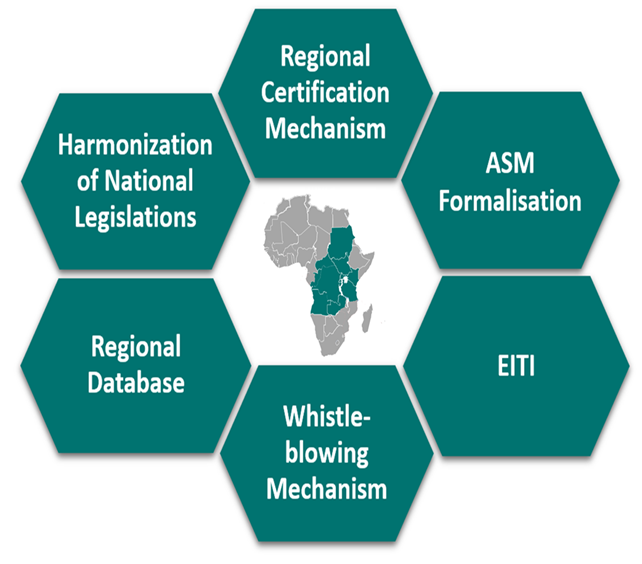Following the signing of the Lusaka Declaration at the Special Summit of Heads of State and Government in 2010, Member States have committed themselves to harmonizing and coordinating policies for the protection and rational management of natural resources in the region.
The Great Lakes region is a frequently cited example of the paradox of abundance. It has a substantial quantity of natural resources coveted on the world market, such as lithium, cobalt and the 3TGS (tin, tungsten, tantalum and gold). The rate of informality in the ICGLR MS is very high in all minerals and reaches more than 90% and The ASM Subsector involves 5 million people in the 12 member states of the ICGLR, and over 30 million depend on it.
However, minerals from the Great Lakes region have long suffered from the distrust of companies and traders listed on international stock exchanges, who have tacitly suspended supplies to avoid being indexed. Moreover, the supply chains of the above-mentioned minerals remain complex and opaque. They are often concentrated in the Great Lakes region, where instability and cyclical conflicts exist as His Excellency Ambassador João Samuel Caholo, Executive Secretary of the ICGLR, stated during 17th Annual Forum on Responsible Mineral Supply Chains.
In response to this persistent challenge of socio-economic inequality and the trade in conflict minerals, the ICGLR has developed a global approach to stop the exploitation of natural resources: the Regional Initiative against the Illegal Exploitation of Natural Resources (RINR). The RINR is made up of six tools namely, Regional Certification Mechanism, Harmonization of National Legislations, Regional Database on Mineral Flows, Formalization of Artisanal Mining Sector, Extractive Initiative Transparency Initiative, and Whistleblowing Mechanism.
Being at the core of the Initiative, the ICGLR Regional Certification Mechanism (RCM) focuses on four minerals namely tin, tantalum, tungsten and gold (3TGs) referred to as “Designated Minerals” under the ICGLR mineral certification scheme.
Five Member states namely, the Republic of Burundi, the Republic of Uganda, the united Republic of Tanzania, the Republic of Rwanda, and the Democratic Republic of Congo are already implementing the ICGLR RCM. It aims to ensure that mineral supply chains do not provide, direct or indirect support to non-state armed groups or security forces engaged in illegal activities and/or serious human rights abuses within and between ICGLR Member States in order to eliminate support for armed groups that perpetuate or prolong conflicts and/or commit serious human rights abuses.
As Mrs. Yvette Mwamba Mwanza, a successful mineral exporter in the DRC who has implemented the RCM, points out, its implementation helped to boost the confidence of mineral exporters with traders and importing countries.
In her view, the RCM has enabled her company KIVU MINERAL RESOURCES SARL to improve its internal governance, with particular emphasis on strengthening control and transparency of the chain of custody in interaction with all stakeholders. This improvement is reflected in the alignment of procedures with management requirements, respect for human rights and gender mainstreaming, which has had a positive impact on the company’s business operations and competitiveness.
As a reference, the RCM has given legitimacy to the supply chains of countries in the Great Lakes Region, thanks to its standard, which has won broad consensus at regional and international level, and with allies such as the UN and the Organization for Economic Co-operation and Development (OECD).
To ensure that the requirements of the Regional Initiative are implemented, article 25 of the Protocol defines the mission of the Regional Committee against the Exploitation of Natural Resources, which is to ensure and steer the effective implementation of the Protocol and the Regional Initiative in Member States.

